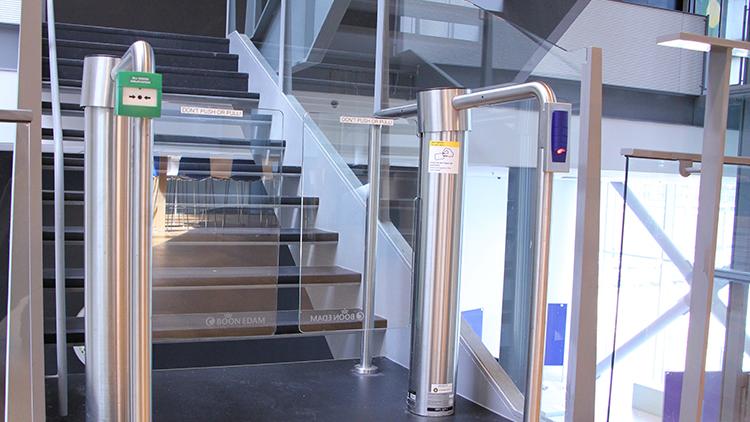Should the university install access gates in its buildings?

Most of the UU’s university real estate is accessible to all. That fits in with the open character of public buildings, according to the university’s executive board. Due to safety measures, laboratories are only accessible to employees holding access passes, and the power plant, for instance, is closed off to the public for obvious safety reasons. Student member of the university council Peter Nafzger says he’s concerned about the open character of university property and the tension that can accompany it. “Personally, I don’t see why it would be necessary for unauthorized people to be able to access places meant for employees and students.” The university’s focus on digital safety should, he says, be expanded to include physical safety as well. He says it would be a good idea to install access gates in all university buildings, to increase the safety of students and staff. All visitors will have to report to a reception desk first. Two exceptions to his plan would be the university libraries and the University Hall.
You’ll keep out people with less than honorable intentions
Peter claims it’s safest when it’s always known who’s inside any given university building – especially in today’s society. “If there’s a fire and no one’s registered who exactly is in the building, how will you know whether everyone’s safe?” he wonders, pointing at the newspaper’s front page story about London’s Grenfell Tower fire. “But it’s not just good to know who’s inside in case of emergency. You’ll also be able to keep out people with less than honorable intentions.” For example, thieves – in the Administration building, regular warnings are sent out to staff after yet another phone or wallet has been stolen. “But, of course, even worse things could happen.”
The council member would like to see all university buildings closed off by means of gates that can be opened with a student card or a staff pass. With the introduction of the new digital student card, this should be easy enough. Besides, he says, there are enough examples of other large public-private institutions that use access gates, such as government buildings or health care providers.
The safety of our buildings is guarded very closely
Themes like (fire) safety are often only discussed after a catastrophe has taken place, Peter says. “Only then will people listen to advice. But then it’ll be too late. It’s better to look ahead and innovate. Investing in access gates would be one idea, but of course other options are also possible. Either way, we shouldn’t be compromising, but following the old Dutch saying: prevention is better than the cure.”
He’s aware that not everybody agrees with him. “I asked Marjan Oudeman about increased security during a council meeting. But not all students in the council agree with me, and I know that most students probably like being able to enter and exit the buildings without encountering obstacles.”
Marjan Oudeman does not agree with Peter. “Although I understand that we’re living in troubled times, I’m not a fan of closing off public buildings,” she said during the council meeting. “The safety of our buildings is guarded very closely. Fire safety is in order, and there are thorough plans to be used in case of calamity or fire. If there’s a fire, the entire building will be checked by the emergency service staff to ensure no one remains in the building. There are regular fire drills – there was one in the Administration building recently. I was outside with my purse in no time. The building was empty very quickly.”
The UU security is founded on a combination of ‘humans, technology and awareness
Joost Petrusma, department head of security for the Facility Services Center (FSC), confirms that the university values the open character of the university buildings. Limited access to some buildings is related to safety concerns, and the FSC always makes a risk analysis first. There are also parts of buildings that are only accessible to authorized personnel. An example is the Uithof’s David de Wied building. “You can enter the building, but if you want to access the laboratories, you’ll need an access pass to open the doors.”
Petrusma says the UU security is founded on a combination of ‘humans, technology and awareness.’ For technology, he refers to – for instance – cameras that are placed near the entrances. There are receptionists and security employees who are trained to spot ‘deviant behavior’. “But there should be constant vigilance among all UU students and staff,” Petrusma says. “The safety of your work and study environment is a shared responsibility. Everyone should be more aware of that.”